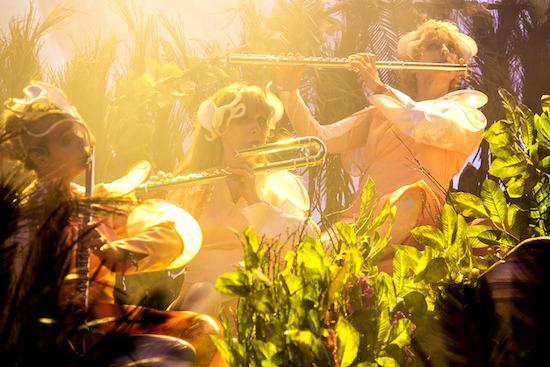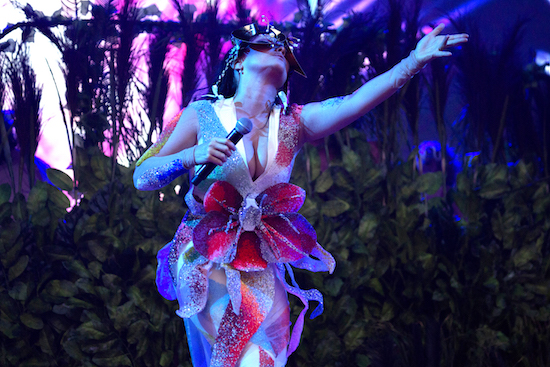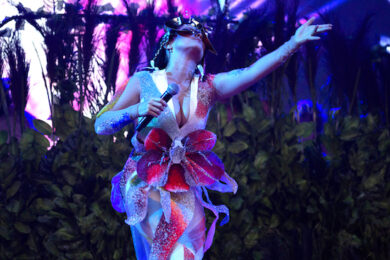Photo by Santiago Felipe
Before Björk or her troupe of celestial flautists have set foot on stage at We Love Green, we are immersed in her universe. Birdsong has been playing over the speakers for half an hour before her appearance; it abruptly stops and a stark red screen displays her alarming manifesto: “It is an emergency / In order to survive as a species we need to define our utopia.” Beneath, the set is decked with lavish plumage and a gargantuan floral sculpture.
We Love Green is in Paris’s Bois de Vincennes, one of the city’s two major ‘green lung’ parks, and it’s the perfect setting for this show: the festival focuses on sustainability and a radical preservationist ideology, and Björk’s current project is a grand and ambitious work on environmental themes. Björk told Jools Holland on Later… last month that Utopia looks at “a utopia that we can hardly imagine now, but we have to save our species. It’s a case of emergency: just to go green.”
As the set proper begins a huge platform draped in leaves rotates to reveal Björk crouched among flowers and grass. She is dressed in a bronze reflective mask and a catsuit decorated with swirls of crystal. A shimmering red orchid around her waist exudes fertility, sexuality and growth. She begins with ‘Arisen My Senses’, and gentle plucks of harp sweep into an opulent rush of shuddering electronics, then with magnificence and precision she makes her way through ‘The Gate’, ‘Utopia’ and ‘Blissing Me’, allowing each song to unfold in hypnotic layers. On ‘The Gate’, a giant fuchsia at the front of the stage unfurls to reveal a flautist who – along with eight others – marches, dances and weaves her way among the leaves, perfectly synchronised with her environment. “It’s all about air,” Björk told Holland when asked about the process of writing Utopia: the album is a buoyant resurgence after the cuttingly mournful Vulnicura, and this quality is keenly felt in its live iteration.
“Huge toxic tumour bulging underneath the ground here / Purify, purify, purify, purify toxicity,” Björk sings on ‘Utopia’, and she’s referring to much more than the environment. The botanic imagery used so widely in her world is rich with yonic imagery: she is advocating a rebuilding of the world, but she repeatedly emphasises that the change must be led by feminine strength. By the time she performs ‘Tabula Rasa’, halfway through the set, we are fully subscribed to her matriarchy: when she cautions us “not to repeat the fuck-ups of the fathers” we nod along. Utopia is arguably the musician’s most explicitly feminist work and ‘Tabula Rasa’ serves as a sermon, walking us through how “women [will] rise and not just take it lying down.” The ethereal flautists and their verdant surroundings take a back seat as Björk’s words alone unite the crowd. Her work, as it often does, appears to be otherworldly but when listened to is purely human. We are all transfixed, softly swaying and fully immersed. “You’re so strong,” she ends on a whisper, as if she is talking just to you.
For those willing to take the plunge, the pure immersion of the set is its most stunning achievement. There is something about the synchronisation of Björk and her performers – slow, deliberate and trance-like with barely a word between songs other than a brief “merci bien” – that is beguiling in a way that transcends just high production values. On ‘Features Creatures’, over ghostlike waves of dark and rhythmless music, each of her flautists swings a rope around her head, at the end of which is a glowing blue orb. It casts a hypnotic serenity, and is the point more than any other that transports us in the truest sense.
Björk doesn’t only play from Utopia, and one of the show’s strengths is how it incorporates songs spanning the breadth of her last quarter-century of work without anything ever jarring. After her opening quartet of new tracks she segues into ‘Isobel’, from 1995’s Post. That track’s heaving strings are substituted live with flutes, tying a 23-year-old fan favourite firmly to the present. ‘Pleasure Is All Mine’, from Medúlla, is almost indistinguishable from her latest material, such is its lush reinvention. ‘Human Behaviour’, arguably Björk’s biggest hit, is greeted by a euphoric roar of recognition so intense that the hypnotic spell of her utopia very nearly loses its grip, but with spars and jabs of flute newly weaved among its poised, rolling drums, she incorporates even this most signature of songs into a whole new universe.

Photo by Santiago Felipe
It would be too simplistic to think that Björk is simply playing the hits to keep the festival crowd happy. Each song fits the theme of our personal connections to nature, relationships and feminine strength. Most obviously on ‘Human Behaviour’: “There’s definitely no logic to human behaviour” feels directly linked to the “fuck-ups of the fathers” she sings of on ‘Tabula Rasa’. With ‘Pleasure Is All Mine’ she reinforces her mantra of the strength in womanhood: “The pleasure is all mine / women like us we strengthen most / host-like when in doubt, give.” When ‘Isobel’ is played there is an immediate rush of excitement in the crowd, but there is also the chance to consider the track in a new context. The naivety is gone while the raw earthy connection to mother nature remains and is intensified. This song is about a personal independence, and when she sings “married to myself” in the context of this beautiful matriarchal dome that she has created, it really feels celebratory.
Utopia can seem like a lighter, imagined version of the world, the antithesis of its heavy, mournful predecessor Vulnicura. Tonight Björk’s choice to end on one of the most furiously aggrieved tracks from Vulnicura, ‘Notget’, shakes this interpretation. There are many references to Vulnicura in her current record, her “chest wound” on ‘The Gate’ for example, that might suggest that although the grief is manifesting itself within a new, buoyant format, it hasn’t simply been resolved. In ‘Sue Me’, she seems to refer to a custody battle with her ex-husband: “Sue me, sue me, sue me all you want… We had the best family / We had it all / We had it all in our hands / He just pulled us through the wringer / Narcissistic.” A relatable bitterness remains in her songs, an understanding that even in your personal utopia you are shaped by your past experiences. Even in such a seamless, visually incredible stage production, Björk is happy to let her vulnerabilities and anxieties show through.
Björk can make you feel like you have entered a world that is lush and green and full of feminine authority to a point where the real world seems disappointingly colourless and misogynist. Tonight we are living in a lush, refreshed land where people have learnt from the mistakes of patriarchy, but personally she is still struggling with the memories of a bitter divorce. The costumes, stage production and of course the music are wonderful, but it is the vulnerability of her words that really allows us to connect. “It’s about figuring out what is your utopian thing that you are hoping for, and what is the real,” she said on Later…. “Then in five years’ time, if you can make half of your utopian dreams come true, that’s pretty good going.”



